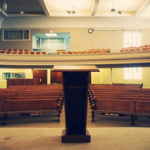Denny Burk interprets the text (original source here:
https://cbmw.org/topics/complementarianism/must-women-really-keep-silent-in-the-churches/ )
The interpretation of 1 Corinthians 14:34-35 has proven to be more than a little controversial over the years. The reason for that is due in no small part to the clash that this text brings to modern egalitarian sensibilities. Paul writes,
33b As in all the churches of the saints, 34 the women should keep silent in the churches. For they are not permitted to speak, but should be in submission, as the Law also says. 35 And if they desire to learn anything, let them ask their own husbands at home; for it is improper for a woman to speak in church.
What is going on in these verses? Does Paul really mean to say that women must never say anything in a worship service? That is how some people have read these verses over the years, but I think that is a misreading of the text. Why? For starters, it would create a hopeless contradiction with what Paul says in 1 Corinthians 11:5, which indicates that women were “praying and prophesying” in the church. Paul doesn’t rebuke their praying and prophesying in church. On the contrary, he gives them instructions on how to do it in the right way! In a way that allows them to speak but that at the same time honors male headship.
Women prophesying in the assembly was in keeping with what the apostle Peter said was characteristic of the New Covenant gift of the Spirit predicted in Joel 2, “‘And it shall be in the last days,’ God says, ‘That I will pour forth of My Spirit upon all mankind; And your sons and your daughters shall prophesy…’” (Acts 2:17). Who’s going to prophesy? Sons and daughters.
So if you take verse 34 to be an absolute prohibition on women speaking at all in a worship service, then you have adopted an interpretation that makes chapter 14 to contradict chapter 11. And that cannot be, because God cannot contradict himself.
This apparent contradiction has led some interpreters to suggest that verses 14:34-35 were not really written by Paul. They argue that some scribe must have come along after Paul and slipped these verses into Paul’s letter. The only problem with this view is that every single Greek manuscript of 1 Corinthians that we have includes these verses. There are a handful of manuscripts in which the verses appear after verse 40. But that is not evidence that verses 34-35 aren’t original to Paul. It’s evidence that some scribes sought to preserve the flow of Paul’s argument about prophecy by moving these two verses to the end. They were wrong to do that, but we would be doing worse than they did to rip them out of the text altogether.
No, these verses are original to Paul. So does that mean we have a contradiction with chapter 11? No, it doesn’t. If we read these verses in context, it’s very clear what is going on here. Paul is commanding the women to keep silent in a certain context—during the judgment of prophecies. Remember what Paul just said in verses 29 and 32:
29 Let two or three prophets speak, and let the others weigh what is said… 32 and the spirits of prophets are subject to prophets.
Prophets are not only supposed to prophesy but also to evaluate other prophesies to see whether they are true. Why? Because the spirits of prophets are subject to prophets. A prophet must submit to the evaluation of other prophets.
But this creates a potential problem. What happens if a husband prophesies, and his wife is a prophet as well? Is the husband supposed to be subject to his wife during the judgment of prophecies? Are husbands and wives supposed to suspend male headship during corporate worship? Paul’s answer to that question is a clear no.
Paul does not want anything to happen during corporate worship that would upset the headship principle that he so carefully exhorted them to obey in 1 Cor. 11:2-16. For that reason, he enjoins women in this context to refrain from the judgment of prophecies. He’s not commanding an absolute silence on the part of women. Indeed he expects them to be praying and prophesying. He does, however, command them to be silent whenever prophesies are being judged. And the women are to do so out of deference to male headship.
Notice that the explanation in verse 34 indicates that headship is indeed the issue: “The women… should be in submission…” The Greek word translated as “submission” is the same one from verse 32. A woman cannot be subject to her husband while simultaneously expecting him to submit to her judgments about his prophecy. To avoid this conflict, Paul says that while women may prophesy, they may not participate in the judgment of prophesies (see D. A. Carson, RBMW). In this case, the judgment of prophecies is tantamount to teaching, which Paul absolutely prohibits in 1 Timothy 2:12.
Paul then instructs:
35 If there is anything they desire to learn, let them ask their husbands at home. For it is shameful for a woman to speak in church.
If a woman has a question about a prophecy, she should reserve all discussions for private conversations with her husband. She shouldn’t raise questions or objections during the worship service. Why? For it is shameful for her to “speak” in any way that might suggest a subversion of male headship. The word translated as “shameful” is only used one other time in 1 Corinthians—in chapter 11:6 where Paul once again is talking about potential violations of male headship.
Again, Paul is not against women speaking altogether. He acknowledges that they are praying out loud and prophesying out loud in the assembly (1 Cor. 11:5). He simply does not want them to evaluate prophecies in the assembly because that would violate the headship norm.
If this interpretation is correct, then there are at least two implications that we should heed during worship with our own congregations. First, we go beyond the example of scripture if we foreclose what Paul clearly allows—women praying and sharing God’s revelation during worship services. I happen to be a cessationist, which means that I do not believe that prophecy is an ongoing experience in Christ’s churches (go here for my defense of cessationism). Having said that, God’s revelation still has a place in our worship services through scripture. Today, reading aloud God’s revelation from scripture is the functional equivalent of prophesying God’s revelation in Paul’s day. Biblically speaking, it would be totally in keeping with Paul’s instructions for women to be reading scripture and praying during the gathered assembly of God’s people. Both of those things can be done in a way that honors the headship principle (cf. 1 Cor. 11:2-16).
Second, it would be a violation of headship for women to teach or to exercise authority in corporate worship. Teaching is explaining and applying an already-given revelation. The judgment of prophecies would have included evaluations which are the functional equivalent of teaching. And that is why Paul does not wish for women to judge prophecies in the gathered assembly. It would be like allowing them to teach and to exercise authority—something that he clearly prohibits in 1 Timothy 2:12: “I do not allow a woman to teach or exercise authority over a man, but to remain quiet.”
Paul has one last item that is worthy of commenting on:
36 Or was it from you that the word of God came? Or are you the only ones it has reached?
Remember that Paul begins his command with an appeal to how things are done “in all the churches” (v. 33b). Why was that a relevant consideration? The word of God is not the exclusive domain of any one church. The word of God did not originate in Corinth, nor was it the only place that it came to. The word of God is abroad in the churches. The Corinthians need to pay attention to how the Spirit of God is moving and working in all the churches. If all the churches are hearing from the Spirit one thing, but the Corinthians are practicing another thing, then that’s a good indication that the Corinthians are the outliers, not everyone else. Everyone else is observing male headship. So also should Corinth. As Paul writes about headship in 1 Corinthians 11:16, “We have no other practice, nor have the churches of God.”
Paul wishes to emphasize that his teaching about male headship is not something that is good for some people but not for others. No, it is a part of God’s creation design, and it is the pattern that must prevail in every church. Verse 36 confirms that the word of God is not the exclusive domain of the Corinthian church. God’s word came to them and to all the other churches. If that is true, then the Corinthians ought to be honoring male headship just as all the other churches do.
People attempt to suppress Paul’s teaching about headship in a variety of ways. Some say that “head” doesn’t really mean authority. Others say that these verses aren’t really written by Paul. Others dismiss “headship” as “white” theology or some other cultural construct. All of that is rubbish. Paul says that the headship principle is recognized in all his churches. And so it must be in ours.


